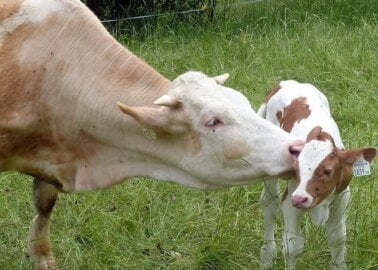Diseases, Parasites, Cruelty: What Scotland’s Salmon Producers Are Hiding From You
Deformed. Diseased. Eaten alive by parasites. A new investigation by Compassion in World Farming reveals salmon on Scottish farms are suffering on an industry-wide scale, infested with parasites in severely crowded, barren enclosures.
The new footage exposes horrific conditions at five of Scotland’s largest salmon producers, which account for over 96% of the industry.
Fish were filmed with parasites eating away at their skin, seaweed growing from open wounds, and chunks of their flesh missing. The footage shows them held in dirty, deoxygenated water, with the corpses of dead, decomposing fish floating among the living.
Scotland is the third-largest producer of farmed Atlantic salmon worldwide. Every year, between 24 million and 56 million fish are exploited on Scottish farms and shipped to over 50 countries.
Salmon Farming Cruelty
Atlantic salmon travel thousands of miles in their natural habitat, but when confined on these fish factory farms, they can do nothing more than swim aimlessly in circles for their short, miserable lives.
Diseases and parasitic sea lice thrive in these filthy, intensive conditions. Not only do these lice inflict painful wounds and eat salmon alive, the processes used to remove them – such as chemical baths and warm water exposure – can cause the salmon additional pain and stress. Many of the fish were found to be carrying countless sea lice.
The mortality rates for fish on Scottish farms are shocking – in the first 10 months of 2020 alone, nearly 3.7 million deaths were reported. These figures don’t account for the fish who are slaughtered for their flesh but include deaths caused by disease, parasites, injuries, and handling.
Also confined on the farms are “cleaner fish”, which farmers use in an attempt to remove sea lice from salmon. Some of them are caught from their ocean homes and endure many of the same horrors as the salmon.
Environmental Impact
Dead salmon are sometimes dumped in landfill sites, which exposes their rotting bodies to wildlife. This could present a biosecurity risk.
The water pollution caused by fish waste and chemicals from Scottish salmon farms can cause harmful algal blooms, which these trapped animals can’t escape. In addition, many of the chemicals released into the environment from these facilities are known to be toxic to other fish, birds, and mammals. Fish who escape these farms into the ocean may mate with wild salmon, producing offspring with genetic mutations that may cause altered behaviour and diminished abilities, potentially affecting the future of wild populations.
Health Hazard
Eating fish can be extremely hazardous to human health. The fish observed in Scotland were wounded, diseased, and infested with parasites, but even the flesh of apparently healthy fish can contain hidden health risks.
Sure, no one wants a mouthful of sea lice or bloody sores, but what about arsenic, mercury, dioxins, or lead? How about PCBs, the synthetic chemicals that pollute water and concentrate in fish flesh? Did you know that your salmon could come with a dose of cancer-causing toxins?
These hazards aren’t limited to salmon reared on farms in Scotland – they can be present in fish raised or caught anywhere in the world by any method.
What You Can Do for Salmon
Salmon are individuals who experience unnecessary pain, suffering, and frustration when confined on fish farms. Scientists agree that the pain-response systems of fish are identical to those of mammals and birds.
Imagine spending your life in a filthy space surrounded by corpses, being denied everything that’s natural and important to you, then suffering the agony of slaughter. The only way to spare fish this misery is to go vegan. Fish belong to themselves, not to us.
To get started, order our free vegan starter kit, which is packed full of recipes, tips, and advice. And check out our guide to vegan fish that will give you that “fishy” taste without harming any animals.




